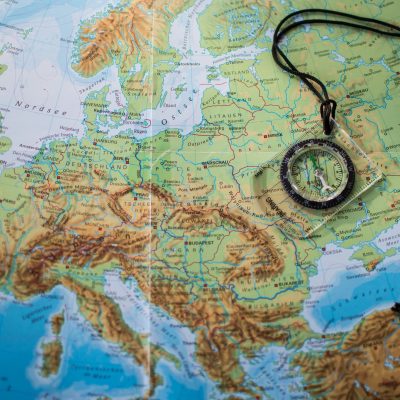[FR] The Moldavians and the EU: a still timid Eurofavour

Moldova was recently in the spotlight when it hosted the European Political Community summit on 1 June, attended by 45 heads of state who wanted to show their support for the country, where there is great concern about Russia’s invasion of neighbouring Ukraine. This aggression prompted the EU-27 to speed up the accession process politically, granting Moldova, along with Ukraine, candidate country status in June 2022.
In 2023, the Commission’s biannual Standard Eurobarometer surveys included Moldova for the first time. This document aims to provide an overview of Moldovans’ (excluding Transnistria) opinions on the EU, based on the main findings.
Perception of the state of the country: prevailing feeling that the situation is poor
In this country of 3.5 million inhabitants, which is among the poorest in Europe, only 29% of citizens considered the general situation to be good in June 2023, while 67% considered it to be poor (with 4% not responding). The same question, concerning the state of the national economy, yielded even bleaker results: 17% versus 77%. Their opinion of the EU economy is much more favourable: 49% consider it to be good, 23% consider it to be poor (and there were more non-responses, 28%). Between the beginning of the year and last June, however, there was an improvement of 7 points for the first indicator and 3 points for the second.
At the same time, when asked about their household’s financial situation, more Moldovans now describe it as good than bad (54% versus 45%); this gap between perceptions of the country and of oneself is also observed in many Member States, but it seems particularly marked here.
What are the main problems facing the country? As elsewhere in Europe, inflation is by far the primary source of concern, cited by 41% of respondents (who were asked to identify the two most important problems from a list of around 15 items), followed by economic and social concerns, including the economic situation (22%), unemployment (15%), the pension system (22%), etc. Energy supply is mentioned by 13%, and the international situation by only 6%.
As for the problems that respondents themselves say they face, the most important are rising prices (45%), followed by economic and social concerns (household financial situation, 16%, and the economic situation, 14%, pensions, 17%, living conditions, 13%, working conditions, 11%, and health, 21%). Concerns about rising prices, while still dominant, have nevertheless lost some of their urgency (down 7 points for the country).
Sense of European identity: a union still far away
The European Union appears to be a rather distant entity in emotional terms.
42% of Moldovans say they feel attached to the EU, 52% do not (6% did not respond). On Europe more broadly, the responses are not very different (45% versus 50%). Whether the population of Moldova has much in common with those in the European Union was the subject of a question asked in last winter’s survey – a proposition tentatively approved by 46% (with 42% holding the opposite view). Furthermore, a very large majority (67%) of Moldovans acknowledged that they were personally poorly informed about the EU (31% thought they were well informed); when asked about the level of information among their fellow citizens in general, they gave similar answers, which were even more mediocre (73% poorly informed, 21% well informed).
Image and perceptions of the European Union: moderately positive
Opinions on the image of the EU are significantly more favourable than unfavourable (44% have a good image, 19% a bad image and 33% a neutral image). These scores are almost identical to the average scores among EU citizens (45% versus 18%, with 36% neutral responses).
Trust in the EU is mixed, at 44% versus 43%. However, it is much higher than that expressed towards the government of the country, which (despite a 6-point increase since the beginning of the year) 29% say they trust, compared to 65% (this gap is also observed in many other European countries). And it is very different from that expressed towards NATO, which is viewed with mistrust by the majority (29% trust it, 53% do not).
What the EU evokes (among some fifteen items proposed to respondents) is first and foremost freedom of movement (36% of citations), followed by peace (28%), then positive economic and social aspects (economic prosperity mentioned by 23%, future quality of life by 27%, social protection by 15%). Democracy, at 18%, is also one of the most frequently cited elements (another question, more directly focused on this point, shows a relatively strong majority of people, 50% versus 34%, who believe that it works well in the EU – much better than at the national level, where only 22% versus 75% give positive responses.
Although the idea of a stronger voice in the world with the EU is not among the most frequently cited responses, Moldovan citizens still consider, by a very large majority (69% versus 16%), that the EU’s voice counts in the world when asked this question directly – an opinion that has strengthened significantly (by 9 points) since the previous survey.
Are things moving in the right direction in the EU? 46% believe so, compared to 27% who do not (and 25% who did not respond). This marks a 6-point increase since January-February; as for the direction things are taking in the country, there has been a spectacular improvement over the same period: 41% consider it to be good (up 15 points), while 46% consider it to be bad.
This question was also asked about the United States, for which favourable and unfavourable opinions are balanced (at 29%, with a very high proportion of non-responses).
Prospect of EU membership: clear trend towards approval
The prospect of EU membership elicits cautious and moderately favourable responses: 43% see it as a good thing, 20% as a bad thing, 31% as ‘neither good nor bad’ (and 3% do not respond): a gain of 3 points since January-February.
Would the country benefit from it? In response to this question, which does not offer any intermediate answers between agreement and disagreement, a clear majority respond positively (58% versus 34%) – an increase of 6 points.
It should also be noted that 54% of Moldovans say they are in favour of a European political community that brings together the leaders of the continent’s countries, whether they are EU members or not (up 6 points here too); 27% disapprove, with 19% not taking a position.
Attitudes towards the war in Ukraine: majority perceptions of the threat from Russia but substantial reluctance to take certain measures against it
The vast majority of Moldovans (53% versus 36%) believe that Russia’s invasion of Ukraine poses a threat to their country’s security: 73% of them believe that this war has serious consequences for the country’s economy, with 19% disagreeing with this idea. As for their personal financial situation, a smaller majority, 54% versus 39%, believe that it is being seriously affected.
The measures taken by the EU in response to the conflict are approved in varying proportions.
There is broad agreement on the provision of humanitarian aid (81%), the reception of people fleeing the war in the EU (77%), and financial aid to Ukraine (65% versus 28%).
Supporters of the sanctions imposed by the EU, who were in the minority at the beginning of the year, now form a relative majority: 46% (up 5 points) are in favour of economic sanctions imposed on the Russian state, Russian companies or individuals, but 41% disapprove; and, despite a 3-point increase, favourable opinions are offset by opposing views on the financing and delivery of military equipment (44% versus 45%).
There are various possible reasons for this divided opinion: lingering Russophilia among a significant portion of the population, encouraged by pro-Russian parties that remain powerful despite their failure in the last presidential and legislative elections; fear of Russia’s reaction to Western and European measures that Moscow considers provocative; economic and commercial dependence that remains despite the gradual reorientation of trade flows – with the worrying proximity of secessionist Transnistria (where Eurobarometer cannot measure public opinion), where Russia maintains garrisons and weapons stocks (and probably other reasons that these initial surveys are unable to detect).
Profile of supporters of EU membership: younger, more educated, wealthier, more urban; and a strong political divide
As the detailed results of the latest Eurobarometer survey were not yet available at the time of writing, we will refer here to those of the January-February survey. Opinions in favour of EU membership are clearly correlated with youth: from 59% among respondents under 25, they fall to 38% among those over 40.
They are also correlated with level of education: from 50% among those who completed their studies at the age of 20 or older – and 61% among those who are currently still students – to 37% among those who did not continue their studies after the age of 15.
Among socio-professional categories, managers stand out clearly, with 60% in favour; and when we consider ‘subjective social class’ (the class to which the interviewees themselves believe they belong), we see that the proportion of supporters of membership ranges from 56% in the upper class and 70% in the upper-middle class to 23% in the working class.
There is also a very clear difference according to declared political preference: 68% of those who consider themselves to be on the political right are in favour of EU membership, compared with 35% in the centre and 24% on the left – a result that should probably not be interpreted using Western European criteria: the ‘right’ probably corresponds closely to groups opposed to pro-Russian communist or post-communist parties, while the ‘left’ corresponds to their supporters.
Supporters of EU membership are almost twice as likely to be found among those who consider the impact of the war in Ukraine to be serious for the national economy than among those who hold the opposite view (50% of the former, 27% of the latter) – and the responses are similar for opinions concerning the personal financial consequences for those interviewed.
Finally, urban dwellers are more favourable than rural dwellers, including the inhabitants of the capital city of Chisinau, 55% of whom are in favour. An examination of the results by region in this small country reveals significant differences from one place to another, which we are unable to interpret – except in the case of the autonomous region of Gagauzia, home to a population of distant Turkish descent (whose language is derived from Turkish) that has long been Russified: a region courted by Russia, which had tried in vain to encourage its secession, as in Transnistria, and where a fairly strong Russophilia remains, as in Comrat, the regional capital.
The correlations described here are also found in the responses to other questions relating to the European Union: attachment to the EU, image, confidence it inspires. They can also be seen in attitudes towards a European political community bringing together the leaders of countries from across the continent.
Conclusion
In Moldova, attitudes towards the European Union are characterised by moderate expectations, coupled with significant reservations on the part of a substantial minority of the population – including citizens who remain Russophile, encouraged in this position by pro-Russian parties that remain powerful even though they are no longer in power. These parties are contributing in particular to significant reluctance towards European sanctions and military support for Ukraine, in a context where, however, fears of the Russian threat are widespread and where the serious economic consequences of the conflict are said to be felt.
Although the EU remains a rather distant and unfamiliar entity in the minds of many Moldovans, attitudes towards it are mostly favourable. Recent demonstrations of solidarity from other Europeans seem to have contributed to a strengthening of support in this regard, and at the same time to a less gloomy outlook on the state of the country.
A positive sign for the future is that attitudes are much more favourable among the younger part of the population. As elsewhere in Europe, urban dwellers are more positive than rural dwellers, and pro-European sentiment is strongly correlated with level of education and social status, which nevertheless carries a risk of perceptions of elitism that should undoubtedly be guarded against.




